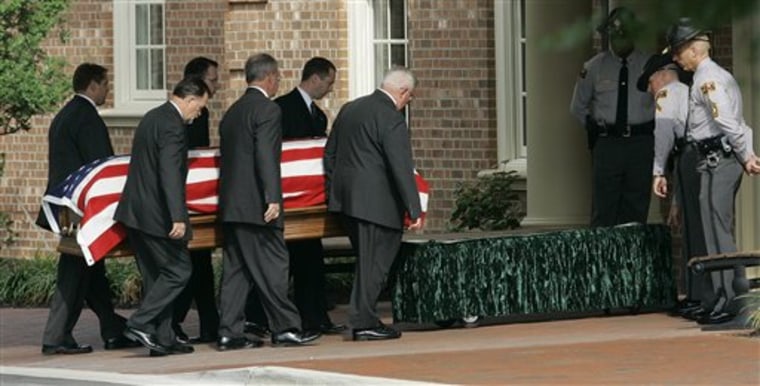Mourners who attended a viewing of former North Carolina Sen. Jesse Helms on Monday remembered the conservative champion as the last politician of his kind.
Helms, who died Friday after years of failing health, lay in a closed casket covered with a U.S. flag and flanked by state troopers at Hayes-Barton Baptist Church.
The Republican, who served in the Senate from 1973 to 2003, worshipped there for decades and served as a deacon.
The front of the sanctuary was decorated with a painting of Helms at work and flowers from U.S. senators including Elizabeth Dole, who took Helms' seat when he retired in 2003.
"The Bible teaches that your 'yes' means 'yes' and your 'no' means 'no,'" said Parker Gresham, 39, of Raleigh. "That's something he followed. You always knew where he stood."
The funeral was scheduled for 2 p.m. Tuesday, followed by a private burial for family members.
Ashley Reid, 50, said he remembered Helms as a man who represented a different type of politics.
"I don't think we have any true statesmen today — I think Jesse was one of the last statesmen the Senate ever had," said Reid, whose father-in-law used to cut Helms' hair in Raleigh. "I didn't totally agree with everything Jesse said. He was controversial. He was polarizing. But I liked the way he stuck to his guns."
Helms won election to the Senate in 1972 and rose to become a powerful committee chairman before deciding not to seek re-election in 2002.
He never lost a political race, but his margin of victory was never large, reflecting his image as a polarizing figure both at home and in Washington. In the Senate, he forced roll-call votes that required Democrats to take politically difficult votes on cultural issues, such as federal funding for art he deemed pornographic, school busing and flag-burning.
He also ran racially tinged campaigns in his last two runs for Senate, defeating former Charlotte Mayor Harvey Gantt, who is black, in 1990 and 1996.
